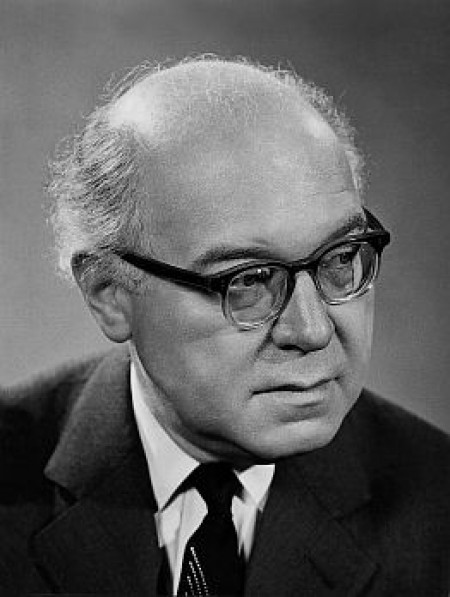
15 December 1905, Nagykanizsa - 14 October 2000, Budapest
Ferenc Farkas, composer and teacher, was an outstanding representative of the generation of Hungarian composers after Bartók and Kodály, and also the most important teacher of the generation after his. He attended secondary school in Budapest, studied music at the National Conservatory, and from 1921 at the Music Academy. He attended Leo Weiner's preparatory class and then gained a composer's diploma as Albert Siklós' pupil. For two years he worked as couch and conductor at the Városi Theatre; then between 1929 and 1931 further developed his composing skills in Rome, in the master course led by Ottorino Respighi. His studies in Rome played an important part in developing his interest in culture and history with a Latin orientation, and in acquiring a thorough knowledge of the visual arts and literature. Thus his wide-ranging orientation ensured that at the time when his style was developing he could preserve his own individuality, despite the determining Bartók and Kodály orientation in Hungary. Further, he gained an outstanding knowledge of the treatment of instruments and of orchestration from the one-time Rimsky-Korsakov pupil, Respighi.
On his return to Budapest, he met the film director, Pál Fejős, who in the next few years entrusted him with the composition of the music for many of his films. His first such work was – in collaboration with Viktor Vaszy – composing the music for the film, Itél a Balaton (The judgment of Balaton) in 1932. Till 1936, the bulk if his time was taken up with composing film music. Following his Budapest start, he worked in Vienna and Kopenhagen. But even later, for decades he regularly composed film music. His more than seventy works in this genre, as well as his countless musical accompaniments written for stage and radio plays, not only helped him to acquire a unique compositional routine, but he also adopted the technical solutions and ideas realised in this sphere in his other works – at times borrowing entire movements.
He began teaching in 1935, at first in the Budapest Higher Music School, then, from 1941 onwards, in the Kolozsvár (Cluj) Conservatory, which he directed in 1943/44. Besides this, he worked as the chorus master of the Kolozsvár, and from 1945 the Budapest Opera Houses. After a two-year period (1946-48), during which he directed the Székesfehérvár Music School, he finally settled in Budapest, and from 1949 was professor of composition at the Music Academy, till his retirement in 1975. His most talented pupils included Attila Bozay, Zsolt Durkó, Miklós Kocsár, György Kurtág, György Ligeti, Emil Petrovics, Sándor Szokolay and Lajos Vass.
Practice was the key in Ferenc Farkas's acquisition of a unique professional knowledge. As chorus master and couch he learned the abilities and possibilities of the human voice, as conductor of film music, of the instruments, and at the same time he also successfully used the experiences gained through teaching in his compositions. Practice and a practical sense led him to compose most of his pieces in more than one version, at times in five or six versions of equal value, thus making them available for as many performers and ensembles as possible. One of the characteristic features of his music is that the absolute musical construction can be realised in various ways, but the written variations nonetheless adapt perfectly to the individual possibilities of the instruments or vocals used.
The multi-faceted character of his works covers a very wide spectrum not only as regards the performing apparatus but also the genres. Among his stage works there are operas, operettas, ballets, Singspiels, musicals and theatrical plays alike (the most important ones: A bűvös szekrény (The magic cupboard), 1942; a Furfangos diákok (The sly students), 1949; Csínom Palkó (Csínom Palkó), for which he received the Kossuth Prize, 1949; and Egy úr Velencéből (A gentleman from Venice), 1979-80). Besides these, he composed countless orchestral, solo and chamber pieces, concertos, cantatas, masses, more than two hundred works for choir, folk music adaptations and over a hundred songs. His strong attachment to poetry is manifested not only in the literary value of the texts chosen and their historical time-span from ancient times to the contemporaries, but also in the multiplicity of languages: the authors of the vocal works wrote their poems in twelve languages; the Hungarians among them exceed fifty.
The inspiration for Farkas' music came from many sources, from the dance melodies of the middle ages and Gesualdo, to the direct influence of Stravinsky. Using these influences, Farkas developed a personal musical language. The three fundamental components of his style are Italian neo-classicism, Hungarian folk music, and the milder, more Latin version of dodecaphony, associated with Frank Marin and Dallapiccola. Of these three, sometimes one, sometimes another took the forefront. His ars poetica, which became the general characteristic of his work from the stylistic, genre and linguistic points of view alike, was summed up by the composer himself as follows: "Composing for me is a pleasure, and my aim is to give pleasure to my listeners with my works."
Ferenc Farkas died on 10 October 2000.
L. G.


